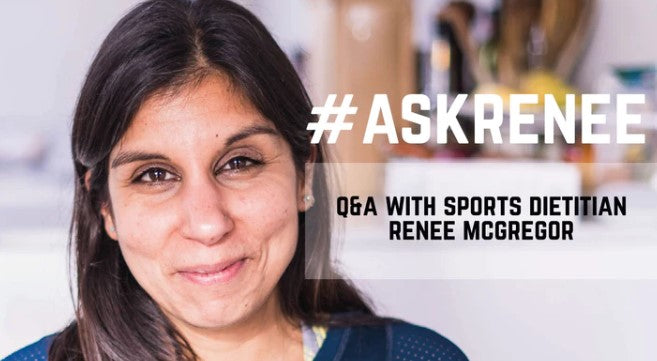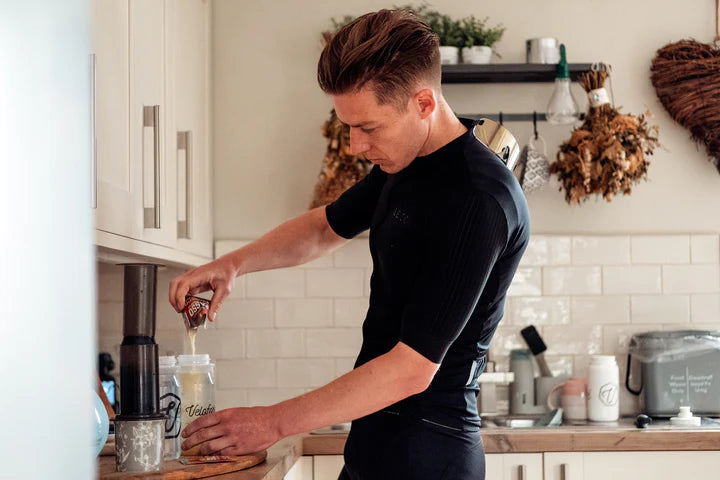Renee McGregor Q&A

Renee McGregor - Dietician, Author, Ultra-Runner and Veloforte ambassador.
We asked you to share with us your questions for Renee and we picked our favourites with all of Renee's top tips and answers below. Grab a cuppa, or a protein shake, and enjoy!
"Top tip: start fuelling early, within the first 20-30 minutes and ensure regular fuelling from this point onwards."
1. Do you have any nutrition tips for 100+ mile rides?
The current sports science recommendations suggest 60-90g of carbohydrate per hour for endurance events taking longer than 3 hours.
This is based on our physiology, with regards to glucose and fructose receptor sites within the human body. So ideally you would take 60g of glucose and 30g of fructose an hour to support your training and prevent your glycogen stores from becoming depleted.
However, in reality, this figure varies considerably from individual to individual and often depends on genetics, gender, gut training, your environment and also the temperature.
From a professional perspective, I would recommend trial and error to start building up your own unique fuelling strategy. This also extends to preference of fuel type. Personally, I prefer real food, like bars, bagels, salted potatoes for as long as possible and then tend to move onto more easily digestible products such as gels, chews and drinks towards the end.
Top tip: start fuelling early, within the first 20-30 minutes and ensure regular fuelling from this point onwards.
2. How should I be fueling for an event lasting 7 minutes at maximum effort?
In general, you will actually be fueling the training for this maximum effort, rather than the focus on the effort itself. Training for such an event tends to involve a lot of repeated high intensity sprints within an endurance framework; think 10 x 400m with 90s recovery. So this repeated sprint action will start to deplete glycogen stores. In order to train your system to be able to maintain maximum pace for 7 minutes, the key is going to be the fuelling and recovery around training.
So you should be working on ensuring carbohydrate availability, especially around these training sessions, with good recovery of carbohydrate and protein immediately after. When it comes to your event, my advice would be to ensure that you have fuelled with sufficient easily digestible carbohydrate, for example, bagel, weetabix or even a carb drink and bar, 2 hours prior.


3. What should I eat for breakfast? I am stuck in a bored rut. I’ve usually worked out first thing.
Before working out, it is key to ensure you have some sort of fuel. For those who have more time, good breakfast options include porridge. I like to top mine with stewed apple cooked with ginger and mixed spice. Or a bagel with peanut butter and banana. For those that need to be out and about early, some ideas include a hot cross bun, fruit smoothie or fruit yoghurt and banana, but always make sure you refuel with a balanced breakfast. Eggs and toast are a great option.
4. What is your favourite quick and easy dinner recipe?
I love curry - it is generally eaten after a long run or hard day of training. This is my favourite and go to recipe:
Chickpea Curry
Can of chickpeas drained
Can of tin tomatoes
2-3 carrots peeled abs chopped
Broccoli florets
1 clove garlic finely chopped
1 fresh chilli finely chopped
Thumb size piece ginger finely chopped
1 dessert spoon cumin seed
1/2 tspn Garam masala
Pinch salt
Pinch tumeric
Oil for cooking
- Fry the garlic, chilli and ginger on a low heat until lightly brown.
- In a separate pan dry fry the cumin seeds until you get an aroma
- To the garlic add the tin tomatoes, salt, tumeric, garam masala and cumin seeds.
- Let the tomatoes pull down so you have an almost smooth paste and darkened in colour.
- Add the remaining ingredients and simmer on a low heat for about 30-40 mins until vegetables are tender.
- Serve with rice or naan bread, Greek yoghurt and mango chutney.

5. How do prebiotics support your gut-health?
Probiotics are foods or supplements that contain live microorganisms intended to maintain or improve our normal microflora in the body. Prebiotics are foods which are typically high fibre such as vegetables, pulses, wholegrains that act as food for this microflora within our gut.
Prebiotics can help to improve the balance of these microorganisms. A Healthy gut microbiome has been linked to many positive associations with both our physical and mental health. Check out the Veloforte Cappo protein shake, containing gut healthy prebiotics.
6. Recently LCHF has been in news. Comments include that for high performance endurance events we only need consume 30 to 50 grams Cho per hour. Do you go along with this or should we be aiming for 60 to 90 ?
LCHF approaches have been popular in endurance sports for some time. They work on the theory that when we do endurance sport, we do not have sufficient glycogen storage to support maintaining a moderate to high intensity for more than 90-120 minutes.
Thus, if we can improve our ability to use more fat for fuel, then we have big stores within our body that we can tap into, meaning we are less reliant on carbohydrate for fuel.
This phenomenon is actually known as “training low” but the science has been misinterpreted with individuals, who don;t fully understand the science, actually advocating a full low carbohydrate, high fat approach.
A study by Mata et al demonstrated some key findings around a LCHF approach:
While there is evidence that “training low” that is is a carbohydrate depleted state, can result in some adaptive responses – this needs to be monitored:
- Should only be sessions completed close to or below the first ventilatory threshold (VT1) and generally no longer than 60 minutes.
- Training low does not mean overall low carbohydrate, for full adaptation, overall CHO intakes are still high but the timing is manipulated.
- Chronic low CHO (>3 weeks) will have negative consequences on health and performance
Indeed Louise Burke concluded that those who follow a LCHF approach actually reduce their economy which has a negative consequence on performance. Additionally, you become less efficient at using carbohydrate for fuel, which means during race conditions, you may find it difficult to tolerate carbohydrate fuel.
That's it from Renee! For more advice you can follow her regular contributions on the Veloforte Instagram and her own channel @r_mcgregor
